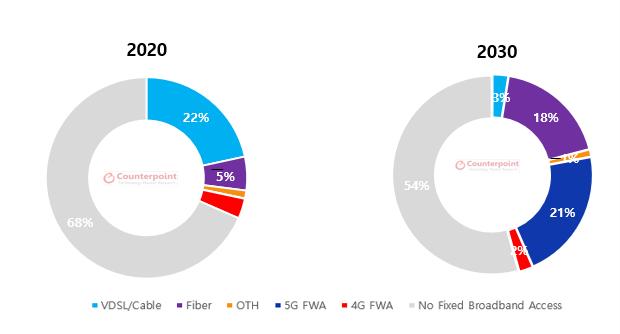Fixed wireless access (FWA), the technology that enables 5G home internet, was among the stars in the Super Bowl Sunday (Feb. 13), as it was featured in commercials during the big game by both T-Mobile and Verizon.
Available in select areas, FWA delivers internet access with the speed of broadband but without the wires. This makes faster internet available in remote areas that didn’t have it before and gives an option to users that previously had only one internet service provider (ISP).
“Fixed wireless is the first killer 5G application,” Dow Draper, executive vice president of Emerging Products Group at T-Mobile, wrote in a press release on the company’s website.
Reaching Homes More Economically
Noting that connecting every home in the country to the internet with fiber is not economical, Draper cited statistics showing that 40 million homes have no high-speed internet, and 25% of all homes have only one ISP available.
Because FWA will be able to reach these homes more affordably, it will help to bridge this digital divide. Draper reported that T-Mobile launched 5G Home Internet in April, and it now covers over 30 million homes and has 646,000 FWA customers.
In the T-Mobile Super Bowl commercial devoted to 5G home internet, actors Zach Braff and Donald Faison of “Scrubs” fame played up the savings that may be available to households in areas that have had only one ISP.
Draper wrote in the release that when consumers have a choice, ISPs will not be as free to raise prices or charge fees.
Offering Another Option for Connected Devices

Verizon too featured fixed wireless access with a Super Bowl commercial and a press release promoting the fact that its new 5G Home Internet is now available to more than 30 million households and its 5G Business Internet is available to over 2 million more businesses.
The company noted that this provides consumers with another option to access fast and reliable home broadband solutions for their smart TVs, tablets, phones, gaming consoles and other connected devices.
It also promoted the fact that the technology is plug and play, so consumers can choose to install it themselves or have it installed by the company.
Manon Brouillette, CEO of Verizon’s Consumer Group, said in the press release, “we’ll continue to bring them to more and more places around the country.”
In Verizon’s Super Bowl commercial, Jim Carrey plays his “Cable Guy” character and is disappointed to learn that with 5G Home Internet, there’s no need for “miles and miles” of wire or for professional installation.
Bringing High-Speed Broadband to Rural Homes
Because it is rapidly deployable and cost-effective, 5G FWA could bring high-speed broadband to nearly half the rural homes in the U.S., CTIA, a wireless industry trade association, said in a November press release.
CTIA reported that 5G FWA speeds vary by location and demand, but generally offer better than 100 megabits per second (Mbps) download speeds and 20 Mbps upload speeds — “fast and competitive speeds that can meet consumers’ broadband needs.”
“As federal and state policymakers implement the historic broadband infrastructure funding programs, 5G to the home services represent a dynamic and cost-effective high-speed connectivity option,” CTIA President and CEO Meredith Attwell Baker said in the release.
——————————
NEW PYMNTS DATA: 57% OF CONSUMERS PREFER ADVANCED ID VERIFICATION AFTER TRYING IT
About:Fifty-seven percent of consumers who’ve used advanced ID verification methods such as voice recognition when contacting customer service say they’d do it again. The Consumer Authentication Experiences report, surveyed nearly 3,800 U.S. consumers to learn how offering innovative verification experiences is helping businesses deliver superior customer service across all channels.








